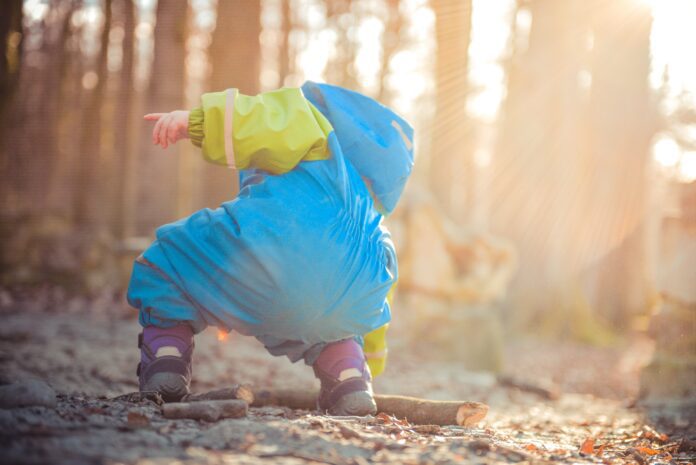Do you feel overwhelmed by all the different things you’re “supposed” to be doing to support your child’s development? Parents today are inundated with advertising, products, and strategies for how to raise smart, kind, successful kids. From monthly subscriptions for the perfect toys to apps that chart and track each element of development with tips and products along the way… it can feel overwhelming to say the least. I’m not writing to attack any such subscription or app – sometimes those tools can be effective and helpful – but rather to invite you to take a deep breath and simply go outside! Being outside positively impacts child development in countless ways. Read on for the top 5 ways being outside benefits child development according to a pediatric nurse practitioner.
Top 5 Ways Being Outside Benefits Child Development
1. Improved Executive Function
Executive function is a term encompassing several different cognitive processes, including working memory, impulse control, and the ability to reason. According to Merriam Webster, executive function is necessary for “organizing tasks, remembering details, managing time, and solving problems.” Often when we think about such functions, our minds envision a school room, textbooks, or other settings of formal education. Being outside, however, is the perfect setting to facilitate child development. A 2018 study found that exposure to nature directly influences executive function and gathered data to support “attention restoration theory” (ART). ART is a theory developed by Stephen and Rachel Kaplan and hypothesizes that experiencing nature ameliorates a person’s ability to concentrate and focus. Moreover, a 2020 study from The International Journal of Early Childhood Environmental Education gathered evidence in support of nature preschools, finding that children in these settings showed improvement in working memory, inhibition, and cognitive flexibility. Importantly, unstructured play outside made up four to five hours of the full-day preschool program.
2. Fine Motor Skills
Being outdoors gives kids the perfect opportunity to practice and strengthen their fine motor skills. Picking up a small rock or acorn, for example, requires the use of a pincer grasp and enhances dexterity. Moreover, the beauty of outdoor exploration is that children will naturally explore their environment on their own and practice these skills without adult intervention or direction, thus also building important skills related to imaginative play. Toddlers may strengthen their fine motor skills by picking flowers or pieces of grass, while a preschooler might trace designs or letters in the dirt/sand/mud with a stick.
3. Gross Motor Skills
Outdoor play also provides the space and terrain for children to run, jump, climb, fall, and get back up again. Being outside benefits child gross motor development in a straightforward way simply by providing the space and scope for full bodied movement. It can be supplemented with swings, bicycles, playground equipment like balance beams or monkey bars, or even swimming. Furthermore, being outside affords children the freedom to engage in broader movement and take physical risks they wouldn’t indoors. In addition to these gross motor skills, a 2017 study from Porto Biomedical Journal cites the importance of taking such risks for children’s development of confidence to overcome challenges and the ability to safely assess different situations.
4. Sensory Development
Even an infant will benefit from ample time outdoors. Every small detail of being outside is ripe with opportunity for sensory experience: the feel of grass on their hands, wind blowing in their face, how the sun feels on their skin, the crunch of a leaf underfoot, the splash of a puddle, and more. All five of the senses – touch, smell, sight, hearing, and even taste (mmm mmm dirt!) – are naturally and frequently employed by children when they are outside. While these experiences might seem mundane to an adult, they are essential brain exercises starting from infancy.
5. Social & Emotional Development
The ways being outside benefits children’s social development are as extensive as they are fascinating. From fostering curiosity, kindness, and connection to developing a stronger sense of self and community, being outside is invaluable. A study from 2017 found the key differentiation between indoor socialization and outdoor socialization was the opportunity for children to interact gradually and by choice, rather than bumping into each other in a confined indoor space. This key difference helps children learn how to connect with each other better and how to play individually. The study also found that exposure to nature increased children’s emotional connection to the environment and helped them develop greater respect and care. Similarly, a 2015 study, which recorded children playing outside by a river and a creek for over two weeks and then performed case studies on a selection of those children, found improved social support and positive interactions between the children.
In a society that tells us over and over again how more material items are not only better, but necessary, consider this article a nudge to reflect on the many instances where less is in fact much more. Being outside in nature, without any additional toys or structure, offers limitless possibilities for improved child growth and development. And bonus, the restorative benefits of nature and outside time are available to grown-ups as well!








